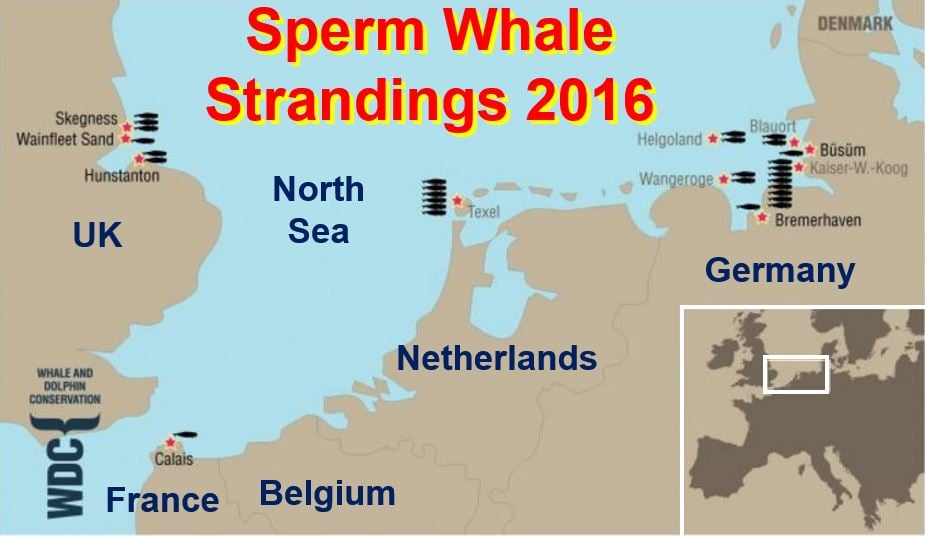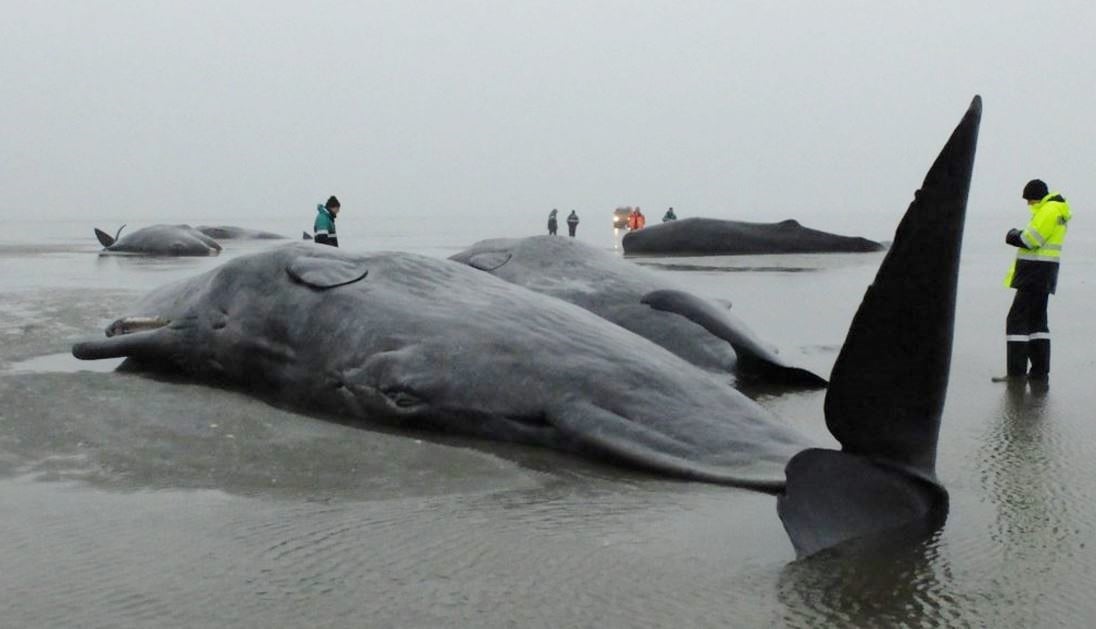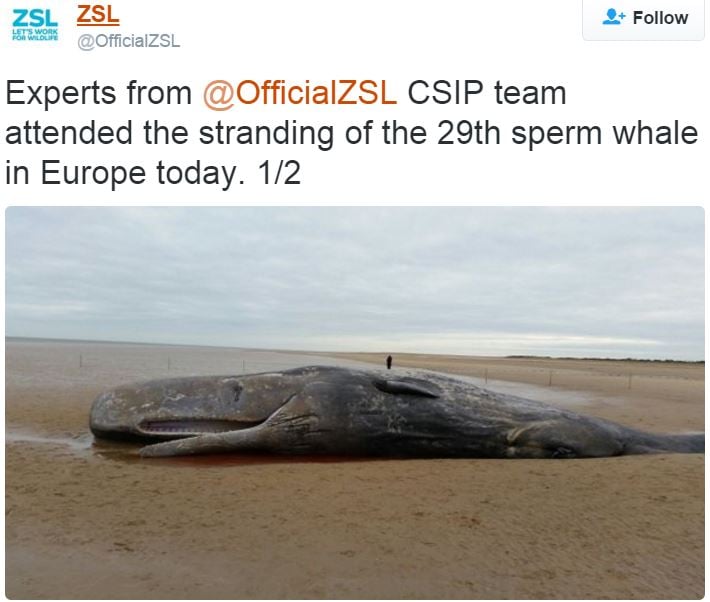The sperm whale deaths on UK and other northern European beaches and coastal waters may be caused by solar activity, suggest experts from the Whale and Dolphin Conservation, a UK-based global charity.
So far, twenty-nine whales have run aground and died on the beaches and shallow waters of eastern UK, France, the Netherlands and Germany since the beginning of this year.
They say that scientists several years ago had discovered links between whale strandings and the solar cycle.
 All the whales that ran aground have been males. That in itself is no surprise – females and calves stay in tropical waters while males can be found as far north as the coastal waters of Norway and Iceland. (Image: uk.whales.org)
All the whales that ran aground have been males. That in itself is no surprise – females and calves stay in tropical waters while males can be found as far north as the coastal waters of Norway and Iceland. (Image: uk.whales.org)
2005 study linking solar activity to whale standings
In 2005, the BBC reported on a study carried out by scientists at the University of Kiel in Germany which suggested that whales may run aground in the North Sea because of disturbances in the Earth’s magnetic field due to increased solar activity.
The scientists explained in the Journal of Sea Research that an analysis of whale strandings from 1712 to 2003 showed that most of the whale strandings occurred when solar activity was high.
They believed that whales use Earth’s magnetic field to help them navigate just like homing pigeons do. Increased solar activity – which is known to disrupt the Earth’s magnetic field – could be confusing them, they said.
The Sun goes through a cycle that lasts on average approximately 11 years. However, individual cycle lengths may range from 8 to seventeen years.
Do whale cells have magnetite crystals?
Dr. Vanselow explained to the BBC that pigeons have small crystals of magnetite in some of their cells that sense the Earth’s magnetic field to help in their navigation.
 Some of the eight sperm whales that have run aground and died in Germany. (Image: twitter.com/WHALES_org)
Some of the eight sperm whales that have run aground and died in Germany. (Image: twitter.com/WHALES_org)
Pigeon enthusiasts have often commented on how their birds go astray during times of increased solar activity.
Dr. Dr Vanselow said:
“It may be the same for whales. Sperm whales migrate long distances with very little visual clues as to where they are going. It would be unsurprising if they too had a magnetic sense.”
“We believe that our research showing that more whales are beached during times when the Sun disrupts the Earth’s magnetic field makes it a strong possibility that they do.”
Regarding the sperm whale that died on the beach on Thursday in Hunstanton, East Anglia, England, Whale and Dolphin Conservation wrote:
“Coastguard officials and staff from the local Sea Life centre attended the scene along with a team from British Divers Marine Life Rescue. Despite efforts to refloat the whale, it eventually died around 8pm.”
“This latest stranding brings the total to nearly 30 sperm whales that have stranded in the UK, France, Netherlands and Germany since the start of the year.”
 Scientists from the Zoological Society of London are currently carrying out tests to see whether they can determine what is killing all these sperm whales. (Image: twitter.com/OfficialZSL)
Scientists from the Zoological Society of London are currently carrying out tests to see whether they can determine what is killing all these sperm whales. (Image: twitter.com/OfficialZSL)
Possible reasons for whales deaths and strandings
The following suggestions and/or possibilities will need to be included or ruled out as the experts try to determine what killed these 29 whales:
1. There is an epidemic that is affecting sperm whales.
2. Injury – this will probably be ruled out, because it is only ever considered when just one animal dies.
3. One got into trouble – toothed whales are fiercely loyal. If one of them got into trouble, others may have come to the rescue and ran aground. However, that does not explain multiple deaths in several different places.
4. Rough weather – this will also be ruled out because the many deaths have occured during rough and calm sea conditions.
5. Following prey – perhaps they followed shoals of squids into shallow waters. This possibility seems unlikely to have been the cause in every case.
6. Shipping noise – a recent US study has shown that ships emit sounds in the frequencies whales use to communicate and locate and chase their prey (echolocation). This possibility will probably be examined carefully.
 Could whales’ navigation systems be disrupted by changes in the Earth’s magnetic field, which is caused by increased solar activity?
Could whales’ navigation systems be disrupted by changes in the Earth’s magnetic field, which is caused by increased solar activity?
7. Solar activity – as described in this articles. This is also a strong candidate.
8. Follow-me stranding – sometimes, larger cetaceans (whales, dolphins or porpoises) follow porpoises or dolphins into shallow coastal waters. This is an unlikely cause for multiple deaths in several different locations.
9. Escape from killer whales – the sperm whales panicked and ran agroung when trying to get away from killer whales. This is highly unlikely – killer whales tend to go after juveniles, and very rarely target adult males.
10. PCBs (polychlorinated biphenyls) – chemicals which were banned in the 1980s, still linger in seawater and are known to harm killer whales and dolphins. This could be a strong candidate.
Sperm whale behaviour
According to Whale and Dolphin Conservation, the sperm whale (Physeter macrocephalus) is one of the deepest-diving marine animals in the world. Typically, they make dives of up to 400 metres (1,312 feet). However, they have been known to reach a depth of 3 kilometres (1.86 miles).
Experts say the marine mammal is able to hold its breath for up to two hours, with 45 minutes being the average dive time.
Some sperm whales get into fights with giant squids and have scars on their bodies caused by squid tentacles.
Their favourite prey are deep-water squid, which we think they catch using a suction method. They are also known to eat a wide variety of other sea creatures.
Sperm whales are generally gregarious animals, and spend much of their lives in ‘nursery schools (adult females with young), or bachelor schools (pods of males aged up to 27 years).
Older males, however, are typically solitary animals, or may belong to very small groups. Males join the nursery schools during the breeding season.
The sperm whale has just one natural predator – the orca (killer whale), and even then very few attacks end in death.
When orcas try to grab a calf, the females form a ‘marguerite’ – a ring with the juveniles and babies in the middle.
Video – Sperm whale stranded in shallow water
This ITV news video was broadcast before the sperm whale died on the Hunstanton beach that evening at 8pm.
